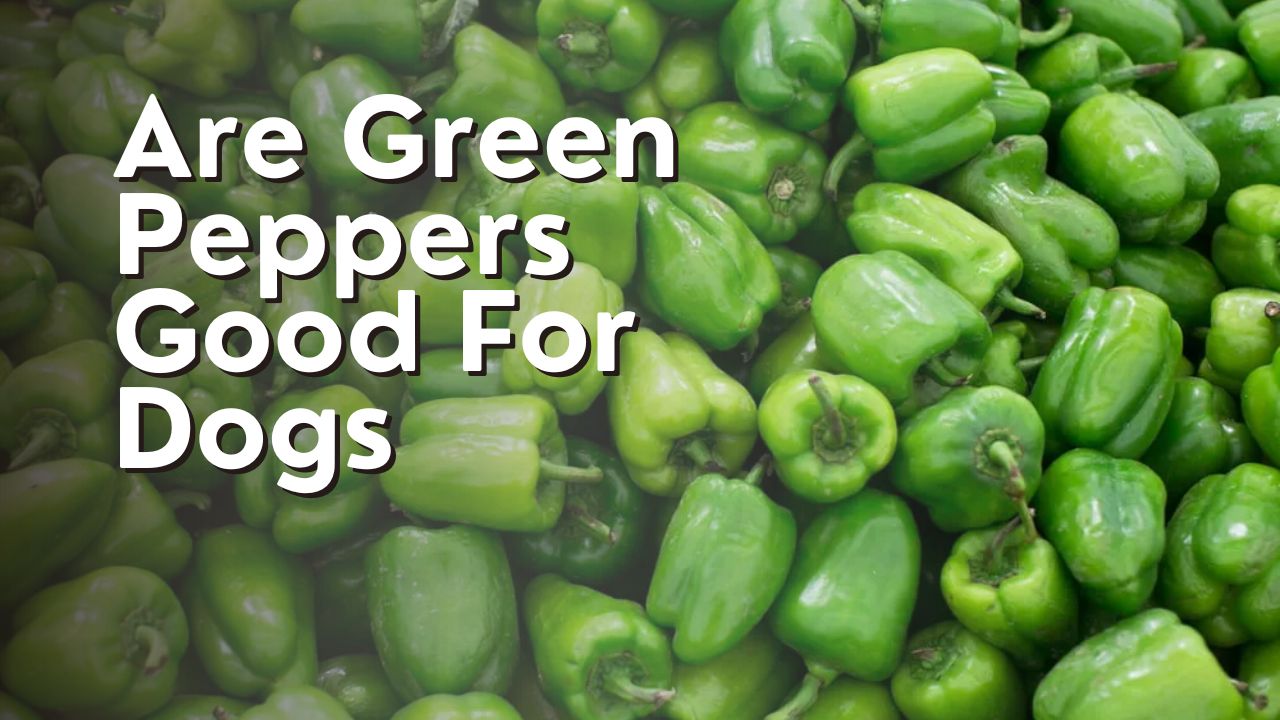Are green peppers good for dogs? That’s a question that many pet owners might find themselves asking. Well, as a dog lover and owner myself, I can tell you that green peppers can actually be a nutritious addition to your furry friend’s diet. They are not only low in calories, but they also contain essential vitamins and minerals that can benefit your dog’s overall health. Plus, green peppers are packed with antioxidants, which can help support a strong immune system.
But before you start adding green peppers to your dog’s bowl, it’s important to know how to introduce them properly and in the right amounts. Just like with any new food, it’s best to start small and gradually increase the portion size. And of course, it’s always a good idea to consult with your veterinarian to make sure green peppers are suitable for your dog’s specific needs and any potential health conditions they may have.
So, let’s dive into the nutritional benefits, how to serve green peppers, and the potential risks and precautions to keep in mind when it comes to feeding your dog this colorful veggie.
Nutritional Benefits of Green Peppers for Dogs
Green peppers offer a multitude of nutritional benefits for dogs. They are low in calories and high in essential vitamins and minerals. One key nutrient found in green peppers is vitamin C, which boosts the immune system and promotes overall health. Additionally, green peppers are rich in vitamin A, which maintains good vision and a healthy coat. They also contain fiber, aiding in digestion and preventing constipation. Green peppers are a great source of antioxidants, reducing inflammation and fighting against free radicals. It’s important to feed green peppers in moderation and remove the seeds and stem, as they can be difficult for dogs to digest. Overall, green peppers are a nutritious and tasty addition to a dog’s diet.
Introducing Green Peppers to Your Dog’s Diet
Adding this vegetable to your furry friend’s meals will surely make their taste buds dance with delight! Green peppers are not only delicious, but they also offer numerous health benefits for your dog. Here are some tips on how to introduce green peppers to your dog’s diet:
- Start slow: Begin by giving your dog a small amount of chopped green peppers and see how they react. If they enjoy it and show no signs of stomach upset, you can gradually increase the portion size.
- Mix it up: Incorporate green peppers into your dog’s regular meals by mixing them with their usual food. This will not only add flavor but also provide additional nutrients.
- Cooked or raw: Green peppers can be fed to your dog both cooked or raw. However, keep in mind that cooking can make them easier to digest for some dogs.
- Remove the seeds and stem: Before feeding green peppers to your dog, make sure to remove the seeds and stem as they can be a choking hazard.
Remember, every dog is different, so it’s important to monitor your furry friend’s reaction to green peppers. If you notice any digestive issues or allergies, consult your veterinarian.
Adding green peppers to your dog’s diet can be a healthy and tasty addition, so give it a try and see how your pup enjoys this crunchy and nutritious treat!

Serving Green Peppers to Dogs
One way to incorporate green peppers into your dog’s diet is by including them in their regular meals, either cooked or raw, to provide added flavor and nutrients. When serving green peppers to dogs, it is important to remember a few key points.
Firstly, make sure to remove the seeds and stem before feeding them to your furry friend, as these parts can be difficult for dogs to digest. Additionally, it is recommended to cut the peppers into small, bite-sized pieces to prevent choking hazards.
If you choose to cook the green peppers, avoid using any seasonings or oils that may be harmful to dogs. Simply steam or boil the peppers until they are tender, and then let them cool before serving. Some dogs may prefer the taste and texture of cooked peppers, while others may enjoy the crunchiness of raw peppers.
It is always important to monitor your dog’s reaction to new foods, including green peppers. While most dogs can safely enjoy this vegetable, some may experience digestive issues or allergies. If you notice any adverse reactions such as vomiting, diarrhea, or excessive gas, it is best to consult with your veterinarian.
With proper preparation and moderation, green peppers can be a healthy and delicious addition to your dog’s diet.
Potential Risks and Precautions
When it comes to serving green peppers to dogs, it’s important to be aware of potential risks and take necessary precautions.
Allergic reactions are possible, so it’s important to monitor your dog closely after introducing green peppers into their diet.
Additionally, the high fiber content in green peppers can cause gastrointestinal upset and potential digestive issues, so it’s best to introduce them gradually and in moderation.
Allergic Reactions
Did you know that green peppers can potentially trigger allergic reactions in dogs? It’s important for dog owners to be aware of this potential risk when considering feeding their furry friends green peppers. Allergic reactions can range from mild to severe and may include symptoms such as itching, redness, swelling, and even difficulty breathing.
To help you better understand the potential dangers, here are three key points to keep in mind:
- Sensitivity: Some dogs may have a natural sensitivity to green peppers, which can lead to an allergic reaction.
- Symptoms: Watch out for signs of an allergic reaction, such as excessive scratching, hives, or vomiting, after your dog consumes green peppers.
- Consult a veterinarian: If you suspect your dog is having an allergic reaction, it is crucial to seek professional advice from a veterinarian to properly diagnose and manage the situation.
Remember, always prioritize your dog’s health and well-being, and consult a professional if you have any concerns.
Gastrointestinal Upset
Take care of your furry friend’s tummy by being mindful of potential gastrointestinal upset. Feeding your dog green peppers in moderation is generally safe, but excessive consumption can lead to digestive issues. Green peppers contain a compound called capsaicin, which can irritate the gastrointestinal tract and cause discomfort. Symptoms of gastrointestinal upset may include diarrhea, vomiting, and abdominal pain. If your dog experiences any of these symptoms after eating green peppers, it is best to consult with a veterinarian. Remember to always introduce new foods gradually and in small quantities to avoid upsetting your dog’s stomach. To give you a visual idea of potential gastrointestinal upset, here is a table that shows common symptoms and their possible causes:
| Symptom | Possible Cause |
|---|---|
| Diarrhea | Food intolerance |
| Vomiting | Gastric irritation |
| Abdominal pain | Gastrointestinal blockage |
High Fiber Content and Potential Digestive Issues
Eating a lot of fiber can sometimes cause digestive problems in our furry friends. While green peppers are considered safe for dogs in moderation, their high fiber content can sometimes lead to gastrointestinal upset.
It’s important to be aware of this potential issue and monitor your dog’s reaction when introducing green peppers to their diet. Some dogs may experience gas, bloating, or loose stools after consuming large amounts of fiber.
To avoid digestive issues, it’s recommended to start with small amounts of green peppers and gradually increase the serving size over time. Remember, every dog is different, so it’s crucial to pay attention to your pup’s individual tolerance and adjust accordingly.
Providing a balanced diet and consulting with a veterinarian can help ensure your dog’s digestive health.
- Gas and bloating may occur
- Loose stools can be a result
- Start with small amounts
- Gradually increase serving size

Consult Your Veterinarian
Before giving your furry friend any green peppers, it’s essential to consult your veterinarian. Your vet knows your dog’s specific needs and can provide personalized advice regarding their diet. They can determine if green peppers are suitable for your dog based on their health condition, age, and any pre-existing dietary restrictions.
While green peppers are generally safe for dogs, it’s important to be aware of potential digestive issues. Green peppers contain a significant amount of fiber, which can be beneficial for dogs with certain digestive problems. However, consuming too much fiber can cause stomach upset, gas, or diarrhea in some dogs. Your vet can help you determine the appropriate amount of green peppers to include in your dog’s diet to avoid these issues.
Additionally, your veterinarian can guide you on how to prepare green peppers for your dog. It’s crucial to remove the seeds, stems, and any potential pesticides or harmful substances before feeding them to your furry friend. Your vet can advise you on the proper way to wash and cut the peppers to ensure your dog’s safety.
Remember, it’s always better to be safe than sorry when it comes to your dog’s diet. Consulting your veterinarian before adding green peppers to their meals will help you make informed decisions and keep your furry friend healthy and happy.
Frequently Asked Questions
Can green peppers be given to dogs with sensitive stomachs?
Yes, green peppers can be given to dogs with sensitive stomachs. However, it’s important to introduce them gradually and monitor their reaction. If any digestive issues occur, consult a veterinarian.
Are there any specific health conditions or allergies that could make green peppers unsafe for dogs?
Yes, there are specific health conditions and allergies that could make green peppers unsafe for dogs. It’s important to consult with a veterinarian to determine if green peppers are suitable for your dog’s individual needs.
How often can I feed green peppers to my dog?
I usually feed green peppers to my dog once or twice a week. It’s important not to overdo it as too much can upset their stomach. Always monitor your dog for any adverse reactions.
Can green peppers be given as a treat or should they only be included in meals?
Green peppers can be given as a treat or included in meals for dogs. They provide a healthy alternative and can be a tasty addition to their diet.
Are there any alternative vegetables that provide similar nutritional benefits to green peppers for dogs?
Yes, there are alternative vegetables that provide similar nutritional benefits to green peppers for dogs. Some options include carrots, broccoli, and sweet potatoes. These vegetables are rich in vitamins and can be a healthy addition to their diet.
Conclusion
In conclusion, green peppers can be a beneficial addition to your dog’s diet. They are packed with essential vitamins and minerals that can support their overall health.
However, it is important to introduce green peppers gradually and in moderation to avoid any digestive issues.
Always consult with your veterinarian before making any changes to your dog’s diet to ensure it is safe and appropriate for their specific needs.
With proper precautions, green peppers can be a tasty and nutritious treat for your furry friend.


